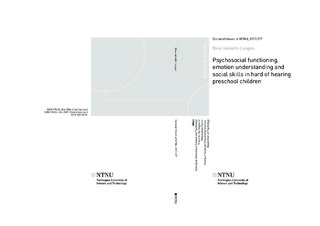| dc.contributor.advisor | Jacobsen, Karl H. | |
| dc.contributor.advisor | Wichstrøm, Lars | |
| dc.contributor.advisor | Rieffe, Carolien | |
| dc.contributor.author | Laugen, Nina Jakhelln | |
| dc.date.accessioned | 2017-09-08T07:13:29Z | |
| dc.date.available | 2017-09-08T07:13:29Z | |
| dc.date.issued | 2017 | |
| dc.identifier.isbn | 978-82-326-2507-9 | |
| dc.identifier.issn | 1503-8181 | |
| dc.identifier.uri | http://hdl.handle.net/11250/2453657 | |
| dc.description.abstract | Barn med hørselstap er i risiko for forsinket utvikling på flere områder. Tidlig diagnostisering og oppfølging har bidratt til bedre utviklingsbetingelser, men vi vet ikke like mye om barn med milde og moderate tap, som de med større tap. I tillegg vet vi mindre om psykososial utvikling enn vi vet om utvikling av språk og kommunikasjon, spesielt hos førskolebarn.
I denne studien ble 35 4-5-åringer med høreapparater inkludert. De fleste hadde milde eller moderate hørselstap og brukte hovedsakelig norsk tale, noen med tegnstøtte. Psykososial fungering, emosjonsforståelse, sosiale ferdigheter og talespråklig ordforråd ble kartlagt. En gruppe på 180 barn med normal hørsel, hentet fra den longitudinelle populasjonsstudien Tidlig trygg i Trondheim, utgjorde kontrollgruppen.
Barn med høreapparater viste flere tegn til psykososiale vansker enn barna med normal hørsel, spesielt gjaldt dette gutter. Barn med tidlig diagnostiserte hørselstap hadde færre vansker. Selv om barn med høreapparater hadde svakere ordforråd enn barn med normal hørsel, var sammenhengen mellom ordforråd og psykososiale vansker svak. Emosjonsforståelsen til barn med hørselstap var like god som barn med normal hørsel. Foreldrene til barn med hørseltap var mer presise når de skulle anslå barnets emosjonsforståelse enn det foreldre til barn med normal hørsel var, og høyere presisjon predikerte bedre emosjonsforståelse hos barna. Sosiale ferdigheter hos barn med moderate og alvorlige tap var på linje med barn med normal hørsel, mens barn med milde eller ensidige tap var betydelig forsinket. Gode sosiale ferdigheter hadde sammenheng med tidlig høreapparattilpasning, men ikke med ordforråd.
Kort oppsummert tyder funnene på at barn med høreapparater er i risiko for vansker innenfor noen områder av psykososial utvikling, allerede i førskolealder. Språkferdigheter, i form av ordforråd, kunne ikke forklare disse vanskene. Tidlig diagnose og intervensjon kan forebygge psykososiale vansker, også for de barna med milde eller ensidige tap.
Summary:
Children who are deaf and hard of hearing are at risk for developing delays or difficulties in many areas. Early hearing detection and intervention have improved the developmental conditions for deaf and hard of hearing children as a group, but we know less about the hard of hearing children than we do about children with more severe degrees of hearing loss. Moreover, psychosocial development has received limited attention compared to language and communication, especially in preschool age.
Therefore, we investigated a group of 35 children aged 4-5 years, with hearing aids. The majority had mild or moderate hearing loss and all used spoken Norwegian as their main language, some supported with signs. Psychosocial functioning, emotion understanding and social skills were assessed, as well as spoken vocabulary. 180 children with typical hearing, derived from the longitudinal population study Trondheim Early Secure Study, were used as a comparison group.
Hard of hearing children showed more signs of psychosocial problems than children with typical hearing, especially boys. Low age at identification of the hearing loss predicted better psychosocial functioning, whereas degree of hearing loss and vocabulary scores did not. As for emotion understanding, hard of hearing children performed similarly as their peers with typical hearing. The parents of hard of hearing children were more accurate when estimating their child’s emotion understanding; and this accuracy was associated with the child’s actual performance. Social skills development was delayed in children with unilateral and mild bilateral loss, but not in the children with moderate to severe loss. Higher scores on social skills were associated with lower age at amplification, but not with vocabulary scores.
Taken together, our results suggest that hard of hearing children, even those with mild and unilateral hearing loss, are at risk for difficulties related to some areas of psychosocial development already in preschool age. These difficulties cannot be attributed to vocabulary delays. Early detection and intervention may prevent adverse psychosocial development, even for children with mild or unilateral hearing loss. | nb_NO |
| dc.language.iso | eng | nb_NO |
| dc.publisher | NTNU | nb_NO |
| dc.relation.ispartofseries | Doctoral theses at NTNU;2017:217 | |
| dc.relation.haspart | Paper 1:
Laugen, Nina Jakhelln; Jacobsen, Karl Henry; Rieffe, Carolien; Wichstrøm, Lars.
Predictors of psychosocial outcomes in hard-of-hearing preschool children. Journal of Deaf Studies and Deaf Education 2016 ;Volum 21.(3) s. 259-267
https://doi.org/10.1093/deafed/enw005 | |
| dc.relation.haspart | Paper 2:
Laugen, Nina Jakhelln; Jacobsen, Karl Henry; Rieffe, Carolien; Wichstrøm, Lars.
Emotion Understanding in Preschool Children with Mild-to-Severe Hearing Loss. Journal of Deaf Studies and Deaf Education 2016
http://dx.doi.org/10.1093/deafed/enw069
This is an Open Access article distributed under the terms of the Creative Commons Attribution Non-Commercial License (CC BY-NC 4.0) | |
| dc.relation.haspart | Paper 3:
Laugen, Nina Jakhelln; Jacobsen, Karl Henry; Rieffe, Carolien; Wichstrøm, Lars.
Social skills in preschool children with unilateral and mild bilateral hearing loss. Deafness and Education International 2017
“This is an Accepted Manuscript of an article published by Taylor & Francis in Deafness and Education International, available online:
http://dx.doi.org/10.1080/14643154.2017.1344366 | |
| dc.title | Psychosocial functioning, emotion understanding and social skills in hard of hearing preschool children | nb_NO |
| dc.type | Doctoral thesis | nb_NO |
| dc.subject.nsi | VDP::Social science: 200::Psychology: 260 | nb_NO |
